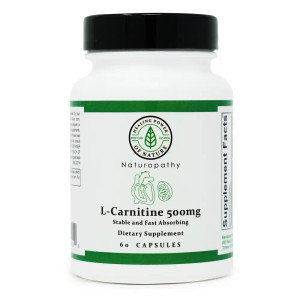Brain-Mag Supports
- Focus and mental clarity
- Age-related memory and cognitive decline
- Sleep quality
- Mood stability and emotional well-being
How Brain-Mag Supports Brain
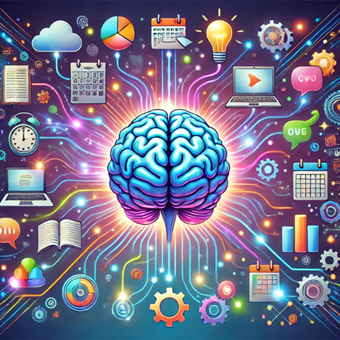
Optimal brain health is essential for an active and energetic life. As the control center for mental, emotional, and physical well-being, the brain relies on a continuous supply of nutrients, including vitamins and minerals, to perform daily tasks like learning, working, and maintaining overall cognitive function. Among these nutrients, magnesium is particularly crucial for brain health.
Unfortunately, approximately 55% of Americans do not meet the daily recommended magnesium intake. Factors such as modern agricultural practices, stress, alcohol consumption, certain medications, and health conditions like diabetes and aging can lead to magnesium deficiencies.
A magnesium deficiency can result in various symptoms, including headaches, difficulty concentrating, memory loss, mood swings, irritability, and poor sleep. As individuals age, these issues may worsen, but supplementing with magnesium can help address these concerns. However, the challenge lies in delivering magnesium to the brain due to the Blood-Brain Barrier (BBB), which strictly regulates nutrient flow to the brain.
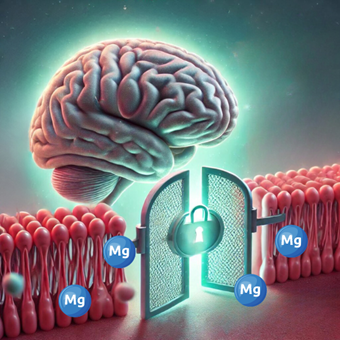
The Solution: Magnesium L-Threonate
Magnesium L-Threonate is a form of magnesium that can effectively cross the BBB, ensuring that your brain receives the magnesium it needs. Discovered by researchers at the Massachusetts Institute of Technology (MIT), this unique magnesium form has been clinically proven to increase magnesium levels in the brain, unlike other magnesium types.
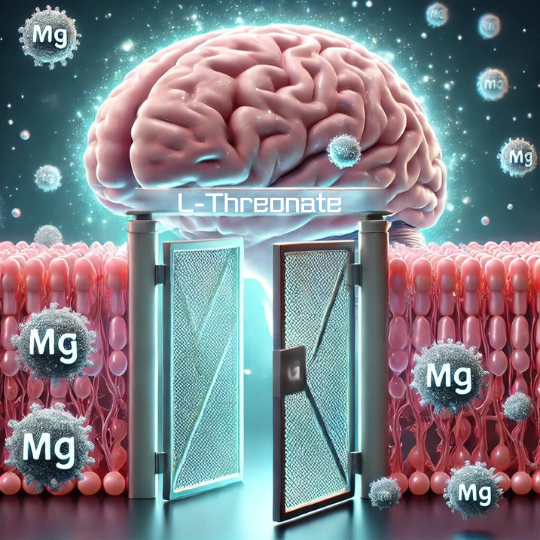
Once Magnesium L-Threonate reaches the brain, it strengthens neuron connections and supports the production of key neurotransmitters. Studies show that regular use of Magnesium L-Threonate enhances concentration, memory, mood, and sleep quality. Research has also found that Magnesium L-Threonate significantly increases magnesium levels in the cerebrospinal fluid within just two weeks of supplementation (1.5-2 g).
- Magnesium and Sleep Quality

Research has shown a strong link between magnesium intake and improved sleep. Magnesium’s ability to bind to GABA receptors, its role in reducing stress responses, and its function as a cofactor in melatonin synthesis explain its impact on sleep quality. One study involving 76 adults with sleep disorders demonstrated that participants taking 1g of Magnesium L-Threonate experienced enhanced sleep quality, faster time to fall asleep, and longer sleep duration. This group also showed improvements in mood and mental health, as well as better REM, light, and deep sleep compared to those on a placebo.
- Magnesium and Mental Wellbeing

Chronic stress affects about 49% of U.S. adults, with up to 60% of these individuals also having a magnesium deficiency. Studies suggest that magnesium can reduce stress by lowering cortisol levels and improving emotional balance. In the brain, magnesium helps produce dopamine and serotonin—neurotransmitters that are crucial for motivation and happiness. Additionally, it reduces the release of excitatory glutamate and binds to GABA receptors, supporting mood stability. Clinical studies on older adults suffering from stress and anxiety have shown that Magnesium L-Threonate supplementation leads to significant improvements in stress, anxiety, and emotional resilience.
- Magnesium, Memory and Attention

Memory and concentration difficulties affect many people, particularly older adults. Animal studies reveal that Magnesium L-Threonate improves synaptic density and neuron function in the brain. It also increases mitochondrial density and function in the hippocampus, a region involved in memory formation. In human trials, participants with attention difficulties experienced improved cognitive function and focus after supplementing with Magnesium L-Threonate. Furthermore, older adults with memory problems who took 1.5-2g of Magnesium L-Threonate daily saw improvements in short-term and episodic memory, as well as better performance on cognitive tasks.
Causes of Magnesium Deficiency
- Stress
- Excessive alcohol, coffee, or soft drink consumption
- High intake of salt, calcium, or protein
- Poor vegetable intake
- Certain medications
- Ageing
- Diabetes
- Kidney disease
Symptoms of magnesium deficiency in the brain
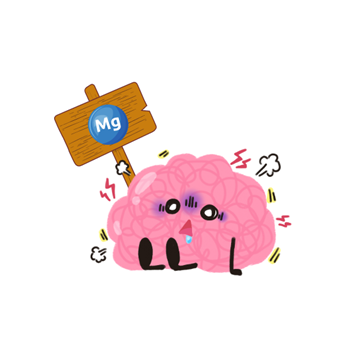
- Increased stress
- Decreased cognitive performance
- Difficulty concentrating and memory issues
- Irritability
- Mood disorders such as anxiety and depression
- Sleep disturbances
- Fatigue
- Headaches
What Makes Natutopathy’s Brain-Mag Unique?
Naturopathy's Brain-Mag is the only magnesium supplement proven to increase magnesium levels in the brain. This product contains Magnesium L-Threonate, which effectively crosses the Blood-Brain Barrier, delivering magnesium directly where it’s needed most.
Additionally, Brain-Mag is free from allergens, synthetic preservatives, and artificial additives, making it a safe option for individuals with allergies or chemical sensitivities.
Directions
Take 1 capsules 1-2 times daily.
Ingredients
In 2 capsules
Magnesium (as Magnesium L-Threonate) 144 mg
Magnesium L-Threonate (Magtein ®) 2 g
Other ingredients: Hypromellose (Natural Vegetable Capsules) and Magnesium Stearate
* Free of Gluten, corn, yeast, artificial coloring, flavor, and preservatives.
References
Hewlings S and Kalman D. A Randomized, Double-Blind, Placebo-Controlled, Comparator Trial Evaluating Magtein® Magnesium Supplement on Quality of Life as Related to Levels of Stress, Anxiety, Fear and Other Indicators. EC Nutrition 17.3 (2022): 07-14
Workinger J, Doyle Robert, Bortz J. Challenges in the Diagnosis of Magnesium Status. Nutrients. 2018;10(9):1202. doi:https://doi.org/10.3390/nu10091202
de Baaij JHF, Hoenderop JGJ, Bindels RJM. Magnesium in man: implications for health and disease. Physiological reviews. 2015;95(1):1-46. doi:https://doi.org/10.1152/ physrev.00012.2014
Zhang C, Hu Q, Li S, et al. A Magtein®, Magnesium L-Threonate, -Based Formula Improves Brain Cognitive Functions in Healthy Chinese Adults. Nutrients. 2022;14(24):5235. doi:https://doi.org/10.3390/nu14245235
Pickering G, Mazur A, Trousselard M, et al. Magnesium status and stress: The vicious circle concept revisited. Nutrients. 2020;12(12):3672. doi:https://doi.org/10.3390/ nu12123672
Volpe SL. Magnesium in Disease Prevention and Overall Health. Advances in Nutrition. 2013;4(3):378S383S. doi:https://doi.org/10.3945/an.112.003483
Maier JAM, Locatelli L, Fedele G, Cazzaniga A, Mazur A. Magnesium and the Brain: A Focus on Neuroinflammation and Neurodegeneration. International Journal of Molecular Sciences. 2023;24(1):223. doi:https://doi.org/10.3390/ ijms24010223
Sun Q, Weinger JG, Mao F, Liu G. Regulation of structural and functional synapse density by L-threonate through modulation of intraneuronal magnesium concentration. Neuropharmacology. 2016;108:426-439. doi:https://doi. org/10.1016/j.neuropharm.2016.05.006
Liu G, Weinger JG, Lu ZL, Xue F, Sadeghpour S. Efficacy and Safety of MMFS-01, a Synapse Density Enhancer, for Treating Cognitive Impairment in Older Adults: A Randomized, Double-Blind, Placebo-Controlled Trial. Journal of Alzheimer’s Disease. 2015;49(4):971-990. doi:https://doi. org/10.3233/jad-150538
The Global Pursuit of Better Sleep Health; 2019. https:// www.usa.philips.com/c-dam/b2c/master/experience/ smartsleep/world-sleep-day/2019/2019-philips-world- sleep-day-survey-results.pdf
Inc G. Americans Sleeping Less, More Stressed. Gallup. com. Published April 15, 2024. https://news.gallup.com/ poll/642704/americans-sleeping-less-stressed.aspx
Akarachkova ES, Shavlovskaya OA. The role of magnesium deficiency in the formation of clinical manifestation of stress in women. Problems of Women Health. 2013, 8, 57.
Surman C, Vaudreuil C, Boland H, Rhodewalt L, DiSalvo M, Biederman J. L-Threonic Acid Magnesium Salt Supplementation in ADHD: An Open-Label Pilot Study. Journal of Dietary Supplements. 2020;18(2):119-131. doi:https://doi.org/10.1080/19390211.2020.1731044
Wroolie TE, Chen K, Watson KT, et al. An 8-week open label trial of l-Threonic Acid Magnesium Salt in patients with mild to moderate dementia. Personalized Medicine in Psychiatry. 2017;4-6:7-12. doi:https://doi.org/10.1016/j. pmip.2017.07.001
†These statements have not been evaluated by the Food and Drug Administra- tion. This product is not intended to diagnose, treat, cure, or prevent any disease.

 US Dollar
US Dollar







